Novels
Barton's first novel, The Testament of Yves Gundron, was published by Farrar, Straus & Giroux in January 2000. The book's titular character is an inventor in the primitive and isolated farming village of Mandragora. When Gundron invents the harness – a device which alters the nature of farming – the villagers' lives change irrevocably. As Yves begins to recount the story of these changes, Ruth Blum, a Harvard anthropologist, arrives to study the village. Although the novel at first appears to take place in the Middle Ages, Yves's brother tells tales of travels to "Indo-China," and the villagers sing songs that are demonstrably examples of the blues.
Some critics found Barton's technique of juxtaposing cultural milieus jarring. [2] But many appreciated the novel's postmodern gamesmanship. In a rare blurb, the famously reticent writer Thomas Pynchon praised Yves Gundron as "[b]lessedly post-ironic, engaging and heartfelt—a story that moves with ease and certainty, deeply respecting the given world even as it shines with the integrity of dream," [3] and John Freeman, writing for Time Out New York , called it "An engrossing folktale that, in our technology-crazed era, ought to be required reading." [4] Yves Gundron was named a New York Times Notable Book of the Year for 2000. [5] It has been translated into Dutch, French, Norwegian, and Greek.
Barton's second novel, Brookland, was published in 2006. Brookland takes as its basis Thomas Pope's "Rainbow Bridge", a bridge that was proposed for the East River nearly a hundred years before the construction of John Roebling's Brooklyn Bridge, but which was never actually built. [6] In Brookland, the bridge is the brainchild not of Pope but of a character invented by Barton: Prudence ("Prue") Winship, the proprietor of a successful gin distillery she inherited from her father. The novel is the story of the costs, both financial and personal, that the planning, construction, and ultimate destruction of the bridge exact from Prue and her community. Upon its publication, Brookland received widespread praise; in a review in The New Yorker magazine, Joan Acocella wrote that Prue Winship "is not a 'good-models' feminist heroine, nor is she one of the bad-girl heroines of second-stage feminism. She is a thorny, struggling soul. Together with the book's profound treatment of the spiritual ills born of the Enlightenment, this wonderful character is Barton's main gift to us." [7] Brookland was also named a New York Times Notable Book, [8] and was named one of the twenty-five best works of fiction and poetry of the year by the Los Angeles Times .
Her third novel, The Book of Esther, is an alternate history tale in which the sixteen year-old heroine leads the resistance of a Jewish Empire against a German invasion in 1942, using magic and steampunk technology.

Thomas Ruggles Pynchon Jr. is an American novelist noted for his dense and complex novels. His fiction and non-fiction writings encompass a vast array of subject matter, genres and themes, including history, music, science, and mathematics. For Gravity's Rainbow, Pynchon won the 1973 U.S. National Book Award for Fiction.
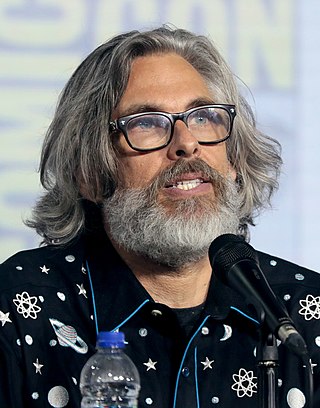
Michael Chabon is an American novelist, screenwriter, columnist, and short story writer. Born in Washington, D.C., he spent a year studying at Carnegie Mellon University before transferring to the University of Pittsburgh, graduating in 1984. He subsequently received a Master of Fine Arts in creative writing from the University of California, Irvine.
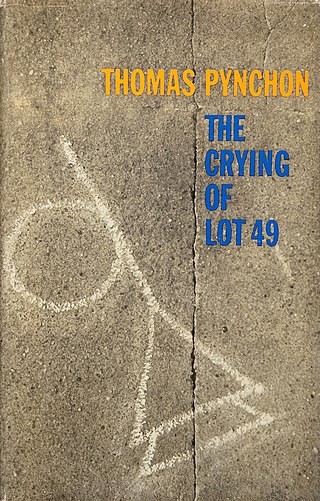
The Crying of Lot 49 is a 1966 novella by the American author Thomas Pynchon. The shortest of Pynchon's novels, the plot follows Oedipa Maas, a young Californian woman who begins to embrace a conspiracy theory as she possibly unearths a centuries-old feud between two mail distribution companies. One of these companies, Thurn and Taxis, actually existed, operating from 1806 to 1867, and was the first private firm to distribute postal mail. Like most of Pynchon's writing, The Crying of Lot 49 is often described as postmodernist literature. Time included the novel in its "TIME 100 Best English-Language Novels from 1923 to 2005".

Gravity's Rainbow is a 1973 novel by American writer Thomas Pynchon. The narrative is set primarily in Europe at the end of World War II and centers on the design, production and dispatch of V-2 rockets by the German military. In particular, it features the quest undertaken by several characters to uncover the secret of a mysterious device, the Schwarzgerät, which is slated to be installed in a rocket with the serial number "00000".

Vineland is a 1990 novel by Thomas Pynchon, a postmodern fiction set in California, United States in 1984, the year of Ronald Reagan's reelection. Through flashbacks by its characters, who have lived the sixties in their youth, the story accounts for the free spirit of rebellion of that decade, and describes the traits of the "fascistic Nixonian repression" and its War on Drugs that clashed with it; and it articulates the slide and transformation that occurred in U.S. society from the 1960s to the 1980s.

The Amazing Adventures of Kavalier & Clay is a 2000 novel by American author Michael Chabon that won the Pulitzer Prize for Fiction in 2001. The novel follows the lives of two Jewish cousins, Czech artist Joe Kavalier and Brooklyn-born writer Sammy Clay, before, during, and after World War II. In the novel, Kavalier and Clay become major figures in the comics industry from its nascency into its Golden Age. Kavalier & Clay was published to "nearly unanimous praise" and became a New York Times Best Seller, receiving nominations for the 2000 National Book Critics Circle Award and PEN/Faulkner Award for Fiction. In 2006, Bret Easton Ellis declared the novel "one of the three great books of my generation," and in 2007, The New York Review of Books called the novel Chabon's magnum opus.
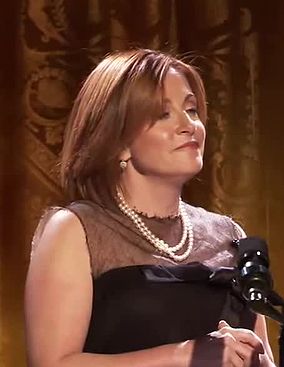
Ayelet Waldman is an Israeli-American novelist and essayist. She has written seven mystery novels in the series The Mommy-Track Mysteries and four other novels. She has also written autobiographical essays about motherhood. Waldman spent three years working as a federal public defender and her fiction draws on her experience as a lawyer.

Geraldine Brooks is an Australian-American journalist and novelist whose 2005 novel March won the Pulitzer Prize for Fiction.
Cynthia Ozick is an American short story writer, novelist, and essayist.

Against the Day is an epic historical novel by Thomas Pynchon, published in 2006. The narrative takes place between the 1893 Chicago World's Fair and the time immediately following World War I and features more than a hundred characters spread across the United States, Europe, Mexico, Central Asia, Africa and "one or two places not strictly speaking on the map at all," according to the book jacket blurb written by Pynchon. Like its predecessors, Against the Day is an example of historiographic metafiction or metahistorical romance. At 1,085 pages, it is the longest of Pynchon's novels to date.

Elizabeth Strout is an American novelist and author. She is widely known for her works in literary fiction and her descriptive characterization. She was born and raised in Portland, Maine, and her experiences in her youth served as inspiration for her novels–the fictional "Shirley Falls, Maine" is the setting of four of her nine novels.
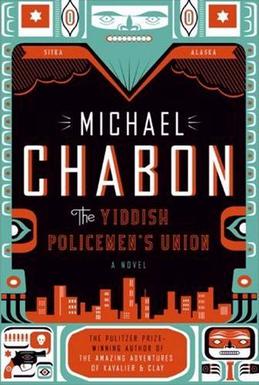
The Yiddish Policemen's Union is a 2007 novel by American author Michael Chabon. The novel is a detective story set in an alternative history version of the present day, based on the premise that during World War II, a temporary settlement for Jewish refugees was established in Sitka, Alaska, in 1941, and that the fledgling State of Israel was destroyed in 1948. The novel is set in Sitka, which it depicts as a large, Yiddish-speaking metropolis.
Christopher Benfey is an American literary critic and Emily Dickinson scholar. He is the Mellon Professor of English at Mount Holyoke College.

Harper Perennial is a paperback imprint of the publishing house HarperCollins Publishers.
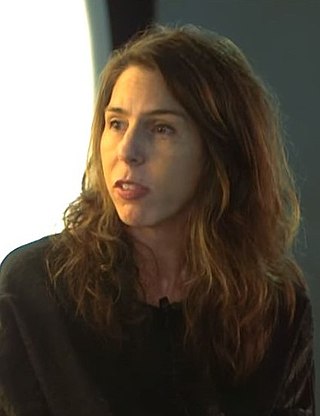
Rachel Kushner is an American writer, known for her novels Telex from Cuba (2008), The Flamethrowers (2013), and The Mars Room (2018).
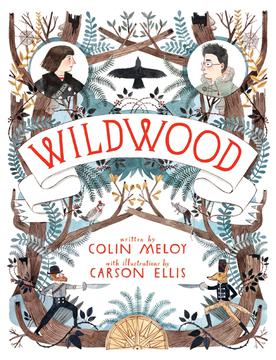
Wildwood: The Wildwood Chronicles, Book 1 is a 2011 children's fantasy novel by The Decemberists' Colin Meloy, illustrated by his wife Carson Ellis. The 541-page novel, inspired by classic fantasy novels and folk tales, is the story of two seventh-graders who are drawn into a hidden, magical forest, while trying to rescue a baby kidnapped by crows. They get caught up in an epic struggle, and learn of their connection to a magical parallel world while confronting adult authorities who are often cowardly or dishonest. The natural beauty and local color of Portland, Oregon, features prominently in the book.
Emily Fridlund is an author and academic best known for her novel History of Wolves.

Barton Levi St. Armand is an American writer and academic. He is Professor Emeritus of English and American Studies at Brown University.
Emily Henry is an American author who is best known for her New York Times bestselling romance novels Beach Read, People We Meet on Vacation, Book Lovers, and Happy Place.













